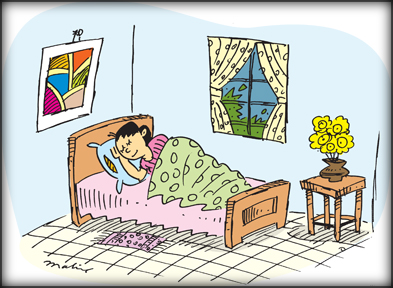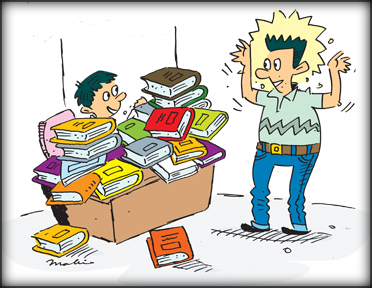|


We use 'much, many, little, few, a lot' and 'plenty' to indicate
quantity. Sometimes, the use of these words is problematic for the
beginner.
Much
 |
|
Would you like sugar in your
tea? Yes, please, A little. |
'Much' is used with uncountable nouns.
How much time can we spend here?
You need much luck to get such a job.
After retirement, I don't have much money.
'Much' is used after negative verbs.
There is never much activity after the festival.
I didn't spend much money to repair my car.
After retirement I don't have much money.
'Much' is used in questions.
Did you have much difficulty learning French?
How much milk do you drink?
'Much' is used in certain idiomatic expressions.
She is not much of a writer. (She is not a good writer).
'Many'
Many is used with plural nouns.
Many people support the government.
Are there many journalists in Sri Lanka?
You have made too many mistakes in this letter.
He doesn't have many friends.
Did you take many photographs when you were in India?
'Many' is used as a pronoun.
Many of his friends are working abroad.
'Many' is used in compound adjectives.
Have you read a story of a many-headed monster?
'As many as' is used idiomatically to indicate surprise.
There are as many as 20 graduate teachers at our school.
'Little'
Little means small (as an adjective)
She lived in a house with a little garden.
'Little' is used after 'nice, pretty, nasty.'
She sleeps in a nice little room.
We had lunch at a pretty little restaurant.
Ask what this nasty little man wants.
'Little' is used to show a short distance or time.
 |
|
She sleeps in a nice little
room. |
Can you wait a little while?
'Little' means not serious or important.
You've made a little mistake.
I have a little problem.
'Little' means young.
She had curly hair when she was little.
Her little sister is only 10 years.
'Little' is used with uncountable nouns. Then it means a small amount
and is negative in meaning.
She has very little time for studies.
We had little rain last month.
The old man has little energy to do this task.
There is very little time to do all the work.
Praba is very busy today. She has little free time.
Surprisingly, there was little traffic today.
This is a boring class. There is little to do.
'A little' means 'some, but not much'. It is positive in meaning.
We have got a little time before the next lecture begins.
She can speak a little French.
Would you like sugar in your tea? Yes, please, A little.
I managed to read a little of the book.
As an adverb, 'a little' means 'to some extent'.
He seemed a little afraid of meeting the principal.
'Few'
When used with plural countable nouns, it means 'not many'. It is
negative in meaning.
Few people attended the meeting.
My father is a man of few words.
Of the 50 passengers, few escaped injury.
'A few' is more positive.
I have a few reliable friends.
Can you lend me a few rupees?
I am going to ask you a few questions.
She has read only a few books.
 |
|
What a lot of books you have! |
'A lot'
'A lot' means 'a large number or amount' Preferable in spoken
English.
What a lot of books you have!
We haven't got a lot of time.
A lot of people are affected by the floods.
The patient is feeling a lot better today.
'Plenty'
'Plenty' means a number or an amount that is sufficient or more than
they need.
Rich people have plenty of money.
There is no need to hurry. We've got plenty of time.
Students have plenty to learn. |
